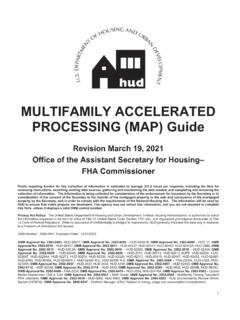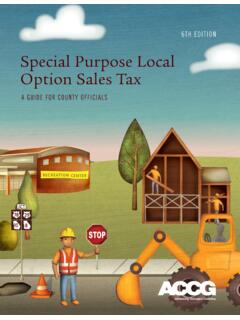Transcription of The IRS Collection Process
1 The IRS Collection ProcessPublication 594 This publication provides a general description of the IRS Collection Process . The Collection Process is a series of actions that the IRS can take to collect the taxes you owe if you don t voluntarily pay them. The Collection Process will begin if you don t make your required payments in full and on time, after receiving your keep in mind that this publication is for information only, and may not account for every tax Collection scenario. It s also not a technical analysis of tax law and does not include a detailed explanation of your rights. For an explanation of your rights, please see Publication 1, Your Rights as a you have questions or need helpPlease visit for your tax needs. You can get answers to your tax questions from the Interactive Tax Assistant You can also check to find all the IRS tax forms and publications mentioned here and the IRS video portal at to view informational videos on a variety of topics in this can also call the number on your bill or visit your local IRS office for assistance.
2 If you don t have a bill, please go to the page and click on View Your Balance or call 1-800-829-1040 (individuals) or 1-800-829-4933 (businesses). Before visiting your local IRS office, check the Services Provided and the hours of operation at Use the Office Locator link by entering your zip code to locate the nearest office which will give you the office address, hours of operation, and services : Filing a tax return, billing, and Collection 2 General steps from billing to Collection 2 What you should do when you get an IRS bill 2 Who to contact for help 2 Ways to pay your taxes 2 Options for paying in full 2 Options if you can t pay in full now 3If you are unable to pay at this time 3 How
3 Long we have to collect taxes 3 How to appeal an IRS decision 4If you don t pay on time: Understanding Collection actions 4 Collection actions in detail 5 Federal Tax Lien 5 Notice of Federal Tax Lien 5 Levy: A seizure of property 6 Summons.
4 Used to secure information 7 IRS Actions Affecting Passports 7 Information for Taxpayers assigned to a Private Collection Agency 7 Information for employers: Collection of employment tax 8 Additional information 8 Publication 594 (Rev. 7-2018) Catalog Number 46596B Department of the Treasury Internal Revenue Service 594 The IRS Collection ProcessOverview: Filing a tax return, billing, and collectionAfter you file your tax return and/or a final decision is made establishing your correct tax, we record the amount in our records.
5 If you owe, we will send a bill for the amount due, including any penalties and interest. If you don t pay or make arrangements to pay, we can take actions to collect the debt . Our goal is to work with you to resolve your debt before we take Collection actions. If your bill is for an individual shared responsibility payment as a result of the Affordable Care Act, the amount owed is not subject to the failure to pay penalty, levies or the filing of a Notice of Federal Tax Lien. However, interest will continue to accrue and the Service may offset federal tax refunds until the balance is paid in full. General steps from billing to collectionYou file your tax return. Most returns are filed annually (by April 15th) or quarterly (businesses with employees).
6 1. If you owe taxes, we will send you a bill. This is your first bill for tax due. Based on your return, we will calculate how much tax you owe, plus any interest and If you don t pay your first bill, we will send you at least one more bill. Remember, interest and penalties continue to accrue until you ve paid your full amount If you still don t pay after you receive your final bill, we will begin Collection actions. Collection actions can range from applying your subsequent tax year refunds to tax due (until paid in full) to seizing your property and assets. This could include an unannounced visit from a Revenue Officer to your home or business. See Role of the Revenue Officer What you should do when you get an IRS billIf you agree with the information on the bill, pay the full amount before the due date.
7 If you can t pay the full amount due, pay as much as you can and visit to consider our online payment options. Our online payment options include the Online Payment Agreement application which allows you to set up an installment agreement online. If you do not qualify for our online payment options, immediately contact us by calling the telephone number on your bill to explain your situation. You should have your financial information available, including your monthly income and expenses. Based on your ability to pay, we may provide you with alternate payment options such as setting up an installment agreement you disagree with the information on the bill, call the number on it, or visit your local IRS office. Be sure to have a copy of the bill and any tax returns, cancelled checks, or other records that will help us understand why you believe your bill is wrong.
8 If we find that you re right, we will adjust your account and, if necessary, send a revised you don t pay the amount due or tell us why you disagree with it, we may take Collection you are in bankruptcy, please notify us immediately. The bankruptcy may not eliminate your tax debt , but we may temporarily stop Collection . Call the number on your bill or 1-800-973-0424. Have the following information available: the location of court, bankruptcy date, chapter and bankruptcy number. Who to contact for helpThe Internal Revenue ServiceMake your first stop for your tax needs. You can find answers with the Interactive Tax Assistant at Please don t hesitate to contact us with any questions you may have. Call the number on your bill or 1-800-829-1040.
9 You can find answers to your questions at or by visiting your local IRS office to speak with an IRS representative in Advocate ServiceThe Taxpayer Advocate Service (TAS) is an independent organization within the Internal Revenue Service that helps taxpayers and protects taxpayer rights. They help taxpayers whose problems with the IRS are causing financial difficulties, who ve tried but have not been able to resolve their problems with the IRS, or believe an IRS system or procedure isn t working as it should. Their service is free. Your local advocate s number is at and in your local directory. You can also call them at 1-877-777-4778. For more information about TAS and your rights under the Taxpayer Bill of Rights, go to Low Income Taxpayer ClinicsAssistance can be obtained from individuals and organizations that are independent from the IRS.
10 IRS Publication 4134, provides a listing of Low Income Taxpayer Clinic List (LITCs) and is available at Also, see the LITC page at Assistance may also be available from a referral system operated by a state bar association, a state or local society of accountants or enrolled agents or another nonprofit tax professional organization. The decision to obtain assistance from any of these individuals and organizations will not result in the IRS giving preferential treatment in the handling of the issue, dispute or problem. You don t need to seek assistance to contact them. They will be pleased to deal with you directly and help you resolve your to pay your taxesTo explore all of your payment options visit To minimize interest and penalties, we recommend paying your taxes in full.













